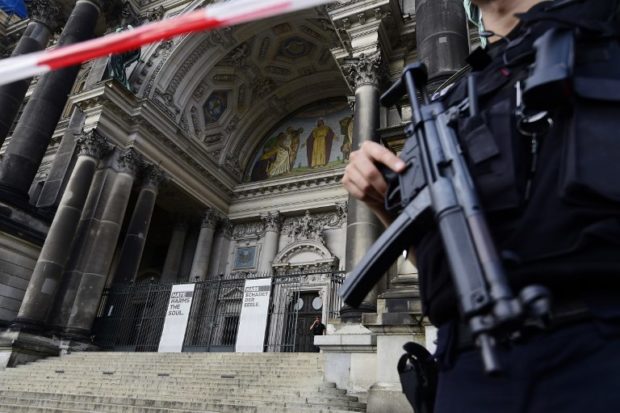Police shoot knifeman at Berlin Cathedral, ‘terror’ ruled out

Armed Police cordon off the Cathedral in Berlin on June 3, 2018, following reports of a shooting.
Police said they shot at a man “rampaging” at Berlin Cathedral and armed officers cordoned off the entrances to the landmark in the heart of the German capital. AFP
BERLIN, Germany — Police shot and wounded a man brandishing a knife inside Berlin’s main cathedral on Sunday but said there was no indication the assailant had a “terrorist” motive.
The man with the knife, a 53-year-old Austrian, was “yelling and causing damage” before being shot in the leg shortly after 4;00 pm (1400 GMT), police said in a statement.
When the incident began, about 100 people were evacuated from the landmark Berlin Cathedral in the heart of the German capital.
When officers arrived they urged the man to put down the knife and tried to neutralize him with irritant gas, to no success, police said.
Finally, they faced the assailant near the altar of the cathedral, and “the man was wounded in the leg by a shot from a policeman,” a spokesman said.
Article continues after this advertisementThe man was hospitalized and underwent surgery, the spokesman added.
Article continues after this advertisementA policeman was also slightly injured by a ricocheting bullet from another officer but was able to leave the hospital in the evening.
Witnesses told local media that the man appeared “very confused”.
“Based on what we know so far, we have no information that the suspect in any way had a terrorist or Islamist motive,” a police spokesman said.
The iron-domed Protestant cathedral, one of the city’s top tourist attractions, is on Museum Island off east Berlin’s main Unter den Linden boulevard and close to the Alexanderplatz shopping district.
An AFP reporter said the entrances to the church were blocked off with red-and-white police tape and several officers with automatic weapons were patrolling the scene.
DPA news agency said some witnesses were taken away to receive psychological counseling.
The shooting comes with authorities in a state of high alert for jihadist attacks after several assaults claimed by the Islamic State group in the country.
Worst attack in Berlin
Like other European nations, Germany remains a target for Islamist militant groups, in particular, because of its involvement in the coalition fighting IS in Iraq and Syria, and its deployment in Afghanistan since 2001.
In the worst jihadist attack in the country to date, Tunisian asylum seeker Anis Amri rammed a truck into crowds at a Berlin Christmas market in December 2016, killing 12.
The assault occurred in the shadow of the Kaiser Wilhelm Memorial Church, a war-damaged landmark in the west of the capital.
A court in March sentenced a 26-year-old Palestinian asylum seeker to life in prison for killing one and wounding six others with a knife in a Hamburg supermarket out of a “jihadist” motive last July.
In April, Berlin police briefly detained six men amid fears of an attack on the city’s half marathon, which drew 36,000 runners.
But they were released when searches of their homes and vehicles netted no weapons, explosives or other evidence.
The same weekend, a German driver in the western city of Muenster plowed a van into an open-air restaurant, killing two people.
The driver later shot himself and investigators cited mental health problems, not a political motive, as being behind the attack.
Germany’s security services estimate there are around 10,000 Islamist radicals in Germany, some 1,600 of whom are suspected of being potentially violent.
Political opponents of Chancellor Angela Merkel, including the far-right AfD party, have charged that the security situation has worsened with the arrival of more than one million migrants and refugees since 2015, many from African and Middle Eastern conflict hotspots. /cbb